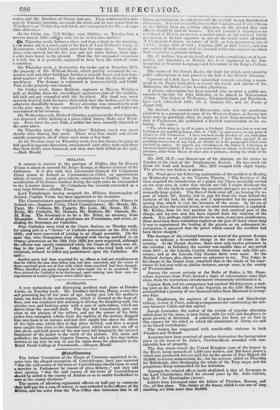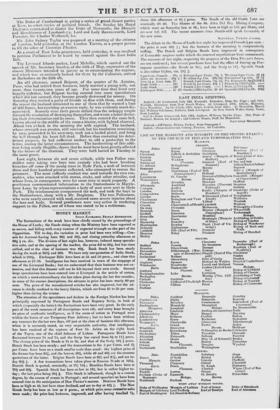Itlitittrfantautt.
The Select Committee of the House of Commons appointed to in- quire into the alleged corruption of Carrickfergus, have just reported "that the said county of the town of Carrickfergus should cease to send a member to Parliament by reason of gross bribery ;" and they add their opinion "that the said county of the town of Carrickfergus should be added to the county of Antrim so as to enable freeholders to vote at the county elections."
The system of allowing regimental officers on half-pay to commute their half-pay for a sum of money, is now extended to the officers of the Militia, and the order from the 'War- Office also intimates that in all
future sppointinents no subaltern will be entitled to any disembodied illiOW:111C(..it is not generally known that Captains and Field- Officers of the Militia have no retiring allowance, on the ground that such officers should be men of fortune. The act renders it imperative for a Colonel of Militia to possess a landed estate of the value of 1,000/. per annum, or be heir apparent to one of the yearly value of 2,000/. A Lieutenant- Colonel, an estate of 600/., or heir-apparent to one of 1,200/. ; Major, 400/. or 800/. ; Captain, 2001. or 400/. a-year ; and that one moiety of such estate shall be situated within the counties to which their respective regiments belong.
Mr. F. Seddon, late at the head of the native establishment of inter- preters and translators at Bengal, has been appointed to the Pro- fessorship of Oriental Languages and Literature in the King's College,. London.
The statue of Sir Joseph Banks, the funds for which were raised by public subscription, is DOW placed in the hall of the British Museum.
Upwards of 1,4001. have been subscribed towards erecting a monu- ment in St. Paul's Cathedral, to record the worth and talents of Dr. Babington, the father of the London physicians.
A private subscription has been entered into to erect a public mo- nument to the late Sir John Malcolm, to be placed in Westminster Abbey. The Dukes of Wellington, Northumberland, and Buccleuch, have each subscribed 100/., Sir J. Giuliani 50/., and the _Paella of Egypt 1001.
.Mr. Belted, the member for Devonshire, who was the gentleman alluded to in a paragraph in some of the Western Papers, as having lost large sums by gambling, when he ought to have been attending to his duty in Parliament, has published a decided contradiction to the ca- lumny. He says- " The whole story is, in all its parts, a falsehood. I have not lost or won one farthing in any ganibling-house, club, or "hell," or race-course, at any game of chance or skill whatsoever. I have not been inside the dour of any such place of resort, even out of curiosity or amusement ; I have been engaged in no gambling transaction of any kind, as alluded to in the paragraphs which have reached my notice. As regards my attendance in the House of Commons, it has been uninterrupted—I have been absent ft-inn no debate or division of im- portance, either from illness or other plea or pretence, during the whole of the session."
Mr. Hill, M. P., was thrown out of his phaeton, on his return to London at the close of the Northampton Assizes. He was much cut about the head and bruised. Mrs. Hill escaped with slight injury.. The phaeton was broken in pieces.
Mr. Wood gives the following explanation of the accident to Keeley,. on Wednesday week, at the Victoria Theatre. "The business of the farce required the introduction of a pistol,' but I have invariably carried on the stage two, in order that should one fail, I might discharge the other. On the night in question the property-man gave me a couple of .unusually large pistols. The first of these -went off; on hearing the re- port of which, Mr. Keeley had to pop.-hie bead out from behind the curtains of the bed; he did so, and I approached for the purpose of seizing him, which is also the business of the scene. In the act of throwing down the second pistol, to my utter astonishment, it exploded. Mr. Keeley, from his low position on the bed, received part of the . charge, and my own arm has been injured from the violence of the shock. It is, perhaps, right also for me to state, in my own justification, there must have been scandalous neglect on the part of those whose duty' it was to superintend the loading of the pistols, as on subsequent in- vestigation, it appeared that the pistol which caused the accident had' been thrice charged."
The decrease of the criminal business at most of the present Assizes seems to indicate a favourable change in the state of crime in the country. At the Dorset Assizes, there were only twelve prisoners in the calendar ; at Salisbury the number was smaller than at any period since 1811; at the Lincoln County Assizes there were only nine pri- soners; and at the Lincoln City Assizes -there were none. At the Rutland Assizes, also, there were no prisoners to try. The Judge, in his charge to the Grand Jury, remarked that in the whole of his expe- rience he had met with no similar instance, except once, in the county of Westmoreland.
Among the recent arrivals at the Baths of Baden, is Mr. Hope, whose departure from Paris formed a topic of conversation some days since, from the mysterious circumstances erroneously attributed to it.
Captain Back and his companions had reached Michipicoton, a trad- ing port on the North side of Lake Superior, on the 15th May, having accomplished ajourney of one thousand miles from Montreal in twenty- one days. Mr. Stephenson, the engineer, of the Liverpool and Manchester railway, is now at Paris, making arrangements for constructing the rail- way between Calais and that capital.
Joseph Lancaster, the author of the system of popular education which goes by his name, is now living, with his wife and daughters, in great poverty, at Montreal. A subscription has been set on foot in this country for his relief, to which the inhabitants of Derby are said to be liberal contributors. The cholera has reappeared with considerable violence in both Flanders and Holland.
Accounts have been received of another destructive fire having taken. place in the town of St. John's, Newfoundland, attended with con- siderable loss of property. The fine steam-vessel, the United Kingdom (one of the largest in the River, being upwards of 1,000 tons burden, and 200 horse power), which was purchased, but not paid for, by the agents of Don Miguel, for 16,000/. to convey ammunition, &c., for the usurper, sailed on Thursday for Edinburgh, after discharging the whole of the Tory cargo, and the proprietors being indemnified- for her detention. Amongst the salaried offices lately abolished, is that of Secretary to the Lord Chamberlain, filled for several years by Mr. John Calvert, late M. P. for Huntingdon (town). Letters from Liverpool state the failure of Fletcher, Roscoe, mid Co., of that place. The claims on the house; which is not one of long standing, are little more than 50,0001.
The Duke of Cumberland is giving a series of grand dinner parties at Kew, to select circles of political friends. On Sunday his Royal Biehness entertained at dinner the Duke of Newcastle, the Marquis and 'Marchioness of Londonderry, Lord and Lady Ravensworth, Lord Forester, Sir Charles Wetherell, &e.
Mr. John Sydney Taylor was proposed at a meeting of the citizens of London, held yesterday, at the London Tavern, as a proper person to fill the office of Common Pleader.
At a court of East India proprietors, held yesterday, it was resolved to petition Parliament to be heard by counsel against the East India The Leeward' Islands packet, Lord Melville, which carried out the speech of Mr. Secretary Stanley, of the 14th of May, expressive of the course Ministers intended to pursue as to emancipating the negroes, and which was so anxiously looked for there by the Colonists, arrived at Barbadoes on the 25th ult,
An old plasterer, named Brignot, of the quarter of St. Antoine, Paris, who had retired from business, lately married a young wife, not more than twenty-two years of age. For some time they lived very happily together, but Brignot having entered into some speculations which did not succeed, they became greatly distressed for money. On Saturday they invited a party of friends to dine with them, and during the repast the husband intunatedlo one of them that he wanted a loan of 600 francs, but receiving an evasive reply, he was evidently much dis- appointed. Scarcely were their gnests retired than the unhappy couple formed the resolution of destroying themselves, and wrote a letter declar- ing their determination and its cause. They then entered the same bed, baying placed in the middle of the room a brazier, with lighted charcoal. About two o'clock in the morning the wife expired. The husband, whose strength was greater, still survived, but his resolution remaining, lie lose, proceeded to his secretary, took out a loaded pistol, and firing the bell through his heart fell dead. Before thus executing his deter- mined purpose, he had sufficient coolnes to add a postscript to the letter, stating the latter circumstances. The handwriting of this addi- tion being nearly illegible, shows that he must have been greatly affected by the fumes of the charcoal. They were both buried on Tuesday in the same grave.
Last night, between six and seven o'clock, while two Police con- stables were taking two boys into custody who had been breaking branches off some of the young trees in Hyde Park, a mob of between three and four hundred persons collected, who attempted to rescue the prisoners. The most ruffianly conduct was used towards the two con- stables, who were attacked with stones, sticks, and other missiles, and whose lives, in consequence, were for some time in much jeopardy. A gentleman communicated information to the Stationhouse in Maryle- bone Lane, by whose representations a body of men were sent to Hyde Park. The reinforcement overpowered the mob, and took the boys to the Stationhouse, along with a Mr. Stapleton. The two Policemen, who were nearly covered with mud, received some severe injuries about the face and body. Several gentlemen were very active in rendering support to the Police, one of whom was stated to be a nobleman.





















 Previous page
Previous page